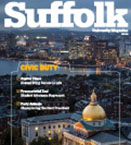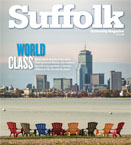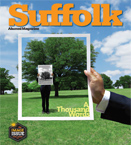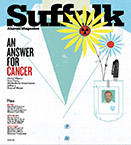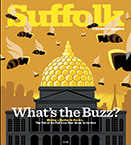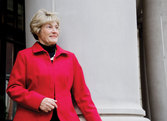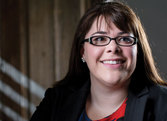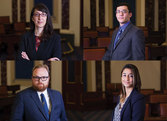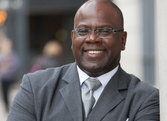On the Same Page
Can you recall the day you first arrived at college to begin your undergraduate experience? Like students everywhere, you probably attended the usual welcome events, went on a tour of the campus and the neighborhood, perhaps signed up for a club or organization. All new Suffolk students participated in a traditional orientation this fall, but in August, seven women, five men, and one student who identifies as genderneutral were also a part of groundbreaking adventure on Thompson Island, four miles from downtown Boston. The 2014 Ram Academy Multiculturalism and Social Justice program focused on the kind of major life issues that most of us probably did not consider until we were well into college and that we are likely still grappling with today. While incoming freshmen are typically scouring the mall on a quest for the last mini-fridge, these 13 intrepid individuals searched their souls about race, identity, privilege, and other complex topics. They volunteered to spend several days on an island with complete strangers, engaging in the kind of candid, sometimes difficult, exchanges even close confidantes often avoid. As participants, they were being asked to step outside their comfort zone before they had even set foot on campus.
Given all the pressures of simply starting college, one might wonder if it was all too much, too soon. But Kelli Connors BA ’10, budget and operations coordinator for Orientation and New Student Programs, explains, “We decided on this timeline because it is important to start these conversations surrounding diversity and race before students get to campus. They learn quite quickly upon arrival on our doorstep that Suffolk is a diverse community of students, faculty, and staff from all walks of life, so we want to prep them for that transition if it is not something that they have experienced before.”
That doesn’t mean there weren’t concerns, particularly among staff who were offering the social justice program for the first time. “I was nervous when I met them that this group would not connect with each other, or respect and commit to the work we were asking them to do,” Connors acknowledges. But on the first day on the island, she got a reassuring sign. “We had given the students a break to go back to their rooms before we moved on to our next activity. I walked out of the meeting room, and I was shocked that a group of students had settled into a tight circle on the grass and were chatting and laughing animatedly like they had known each other for years. They were taking selfies, hugging, and just sharing the moment. I was expecting that once we went on break they would split and run, but they chose to stay together and bond.”
It was an auspicious beginning to the school year and, as our cover story, it’s a harbinger of new beginnings for this
publication as well. Since Suffolk Alumni Magazine [SAM] was launched in 2005, a graduate has been represented on the cover in nearly every issue. By highlighting the stories of our diverse and outstanding alumni, SAM has been telling the larger Suffolk story and putting this University’s best foot forward. Today, our thinking remains the same. What has changed is our readership. SAM is not only an alumni magazine—it has become the de facto University publication, read by faculty, staff, parents, visitors, and even readers far beyond our campus. What we have discovered is that while alumni clearly want to read about their fellow graduates, they also want to keep up with their University today, including the alumni of tomorrow. Conversely, other audiences of this magazine have a strong interest in reading the inspiring stories of this University’s alumni, proof positive of the places future graduates can go with a
Suffolk degree.
So our evolution to a full-fledged university magazine begins with this issue and will roll out in full with the next. The new publication will continue to have a strong emphasis on alumni and will include all of the departments that have become synonymous with SAM. The distinctive storytelling and design that has been recognized with nearly 40 awards from national organizations in communications and education will still be reflected in the future. But our focus will extend to every corner of your University including, as our cover story suggests, students, and we want to make this magazine increasingly accessible to them as well. We hope that alumni will also find the wider scope of our coverage to be a compelling addition.
We share the optimism of Office of Diversity Services Director Jacinda Felix Haro. Following the inaugural Ram Academy Multiculturalism and Social Justice program, she reflected, “Time and time again, our young people coming to college are proving they are more open, accepting, and willing to learn than those before them.” And, she added, “I am extremely hopeful for our future.”
